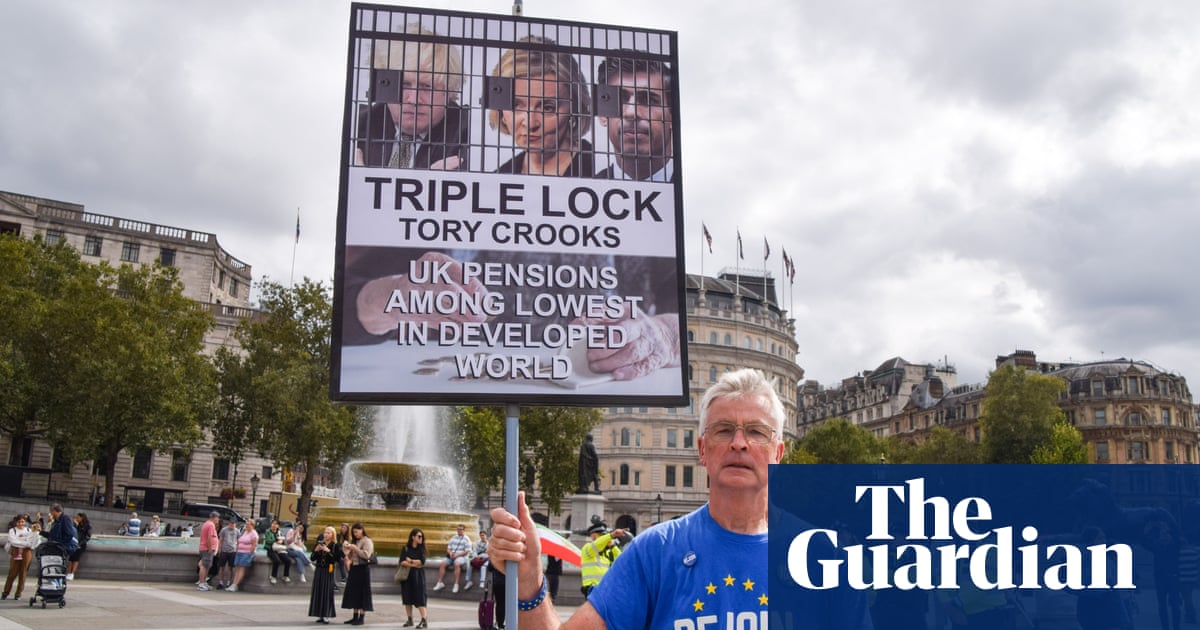
crapping the pensions triple lock, the government’s promise to raise the state pension each year by the rate of inflation, average earnings growth or 2.5%, whichever is highest, seems fair, right? Pensioners have done much better in recent years than the rest of us: the Office for National Statistics estimates that the typical retired household has enjoyed a rise in income of 19% in real terms since 2007-8, while the typical non-retired household has seen only a 2.7% gain. Isn’t it time that older people gave something back?
No, no, no. In fact, it’s young people who will lose out most from this superficially “fair” move. If the triple lock stays, an 80-something will get only a few years of real-terms pension increases. But younger people can look forward to decades of such rises. Because our wealth is the present value of future incomes, scrapping the triple lock will effectively impoverish younger generations today more than old people. Far from promoting intergenerational fairness, scrapping the triple lock will deal yet another blow to young people who have already been comparatively disadvantaged.
Even on its own terms, the claim that the triple lock is unaffordable is wrong. The Office for Budget Responsibility estimates that if it stays in place, state spending on pensioner benefits will rise from 5.9% of GDP now to just under 8% in 2057-8. This is less than many European governments spend on pensions today. Germany, for instance, devotes more than 10% of its GDP to state pensions. If Germany can afford its current state pensions, the UK government will be able to afford its future ones. The triple lock is as affordable as we want it to be.
And if the triple lock is scrapped, making future pensions less generous, younger people will have to make more private provision for their old age. This is both difficult and expensive.
It’s difficult because we face radical uncertainty about future investment returns. Though stock market returns have been good in the last few decades, we have no assurance that they’ll continue to be good in the future. So even if young people can afford to save for a pension – which is a big if – they can’t possibly know how much to save. If they save too little, they risk an impoverished old age. And if they save too much, they deprive themselves of enjoyments in the present, and depress aggregate demand in the economy. The state can manage long-term risks far better than individuals can.
Forcing young people to make private provisions for their old age costs a lot. Fund managers charge a fortune for managing our money. An annual pension fund charge of 0.5% per year (well below the government cap of 0.75% for workplace pensions) could – depending on investment returns – easily cost more than £4,000 over 30 years for every £10,000 invested in a pension. Charges compound horribly over time. There are some jobs that governments can do better than individuals. One of these is providing a pension.
There’s a tendency to see private pensions as a magic money tree that saves the state from having to pay into pension pots. But all pensions must be paid out of current incomes generated by current workers. If it’s a state pension, this transfer is done through taxes. If it’s a private pension it’s done through dividends. If we, as a society, cannot afford the state pension then we can’t afford the private one.
All of which poses the question: why does anybody think it a good idea to scrap the triple lock?
I’ll concede that there’s an issue here. If, as the OBR predicts, average earnings rise 18% next year as hours return to normal, a rigid adherence to the triple lock would require a huge increase in pensions. But this only tells us that blindly following simple rules can sometimes be misguided. It doesn’t undermine the principle of the triple lock.
Another answer is that raising the state pension is seen as a way to steer more money towards the already better off. But if some pensioners’ total incomes are too high the solution is to tax them rather than use means-testing, which has large deadweight costs, to determine whether they receive a higher pension.
Hostility to pensions is often founded on misconceptions. One is what I’ve called the cost bias – the tendency to see some public spending as a cost when it is in fact a transfer. When coupled with the fiction that the government’s finances behave in the same way as a household’s, this fosters the notion that pensions will become unaffordable.
Another misconception has been normalised through decades of neoliberal ideology: that the state is less efficient than the private sector. But in pensions provision the state really can do a better job.
This debate risks becoming another front in a concocted culture war that pits old people against young. It shouldn’t be like this: today’s young are simply tomorrow’s old. How we provide an income for their retirement should be a policy question, addressed by rejecting the myth that a decent state pension is unaffordable.
Who wins from scrapping the triple lock? On the surface at least, it seems young people would benefit. But in fact it will be pension fund managers who get more business as people make their own provisions for retirement. What we have here, then, is an example of how a move that seems fair on the surface inadvertently supports extractive capitalism.
• Chris Dillow is economics writer at the Investors Chronicle. He blogs at Stumbling and Mumbling












